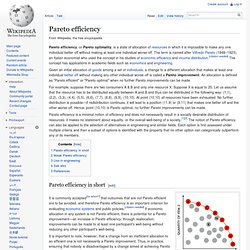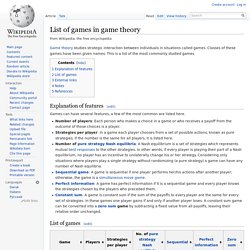

Reflections on the New Paradigm. Zero–sum game. In game theory and economic theory, a zero-sum game is a mathematical representation of a situation in which a participant's gain (or loss) of utility is exactly balanced by the losses (or gains) of the utility of the other participant(s).

If the total gains of the participants are added up, and the total losses are subtracted, they will sum to zero. Thus cutting a cake, where taking a larger piece reduces the amount of cake available for others, is a zero-sum game if all participants value each unit of cake equally (see marginal utility). In contrast, non–zero sum describes a situation in which the interacting parties' aggregate gains and losses are either less than or more than zero. A zero-sum game is also called a strictly competitive game while non–zero-sum games can be either competitive or non-competitive. Zero-sum games are most often solved with the minimax theorem which is closely related to linear programming duality,[1] or with Nash equilibrium.
Definition[edit] Example[edit] Pareto efficiency. Pareto efficiency, or Pareto optimality, is a state of allocation of resources in which it is impossible to make any one individual better off without making at least one individual worse off.

The term is named after Vilfredo Pareto (1848–1923), an Italian economist who used the concept in his studies of economic efficiency and income distribution. [citation needed] The concept has applications in academic fields such as economics and engineering. For example, suppose there are two consumers A & B and only one resource X. Suppose X is equal to 20. Let us assume that the resource has to be distributed equally between A and B and thus can be distributed in the following way: (1,1), (2,2), (3,3), (4,4), (5,5), (6,6), (7,7), (8,8), (9,9), (10,10). Pareto efficiency in short[edit] A production-possibility frontier is an example of a Pareto Efficient Frontier, or Pareto-Optimal Front. It is commonly accepted[by whom?]
In real-world practice, such compensations have unintended consequences. List of games in game theory. Game theory studies strategic interaction between individuals in situations called games.

Classes of these games have been given names. This is a list of the most commonly studied games Explanation of features[edit] Games can have several features, a few of the most common are listed here. Number of players: Each person who makes a choice in a game or who receives a payoff from the outcome of those choices is a player.Strategies per player: In a game each player chooses from a set of possible actions, known as pure strategies. List of games[edit] External links[edit] Notes[edit] Jump up ^ For the cake cutting problem, there is a simple solution if the object to be divided is homogenous; one person cuts, the other chooses who gets which piece (continued for each player).
References[edit] Arthur, W.